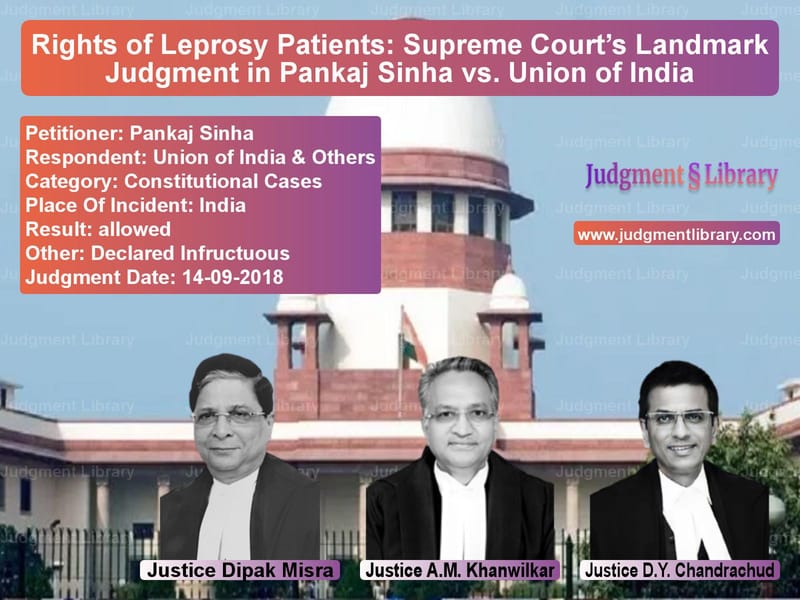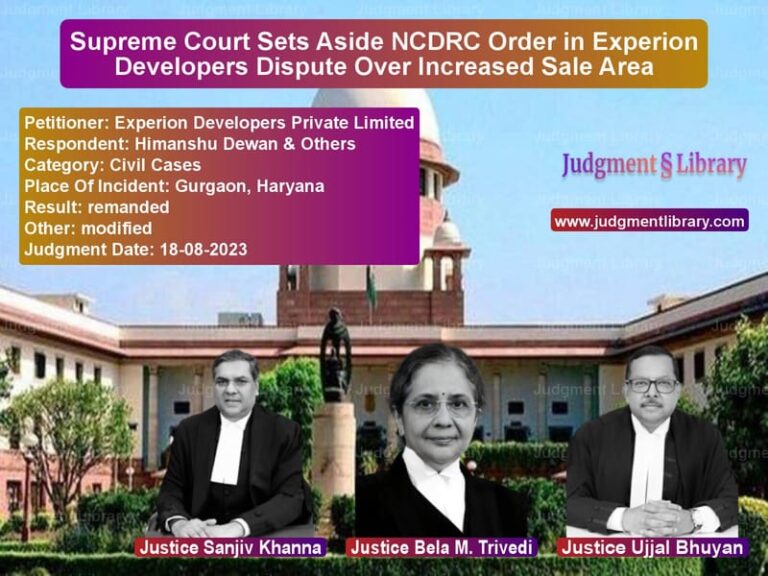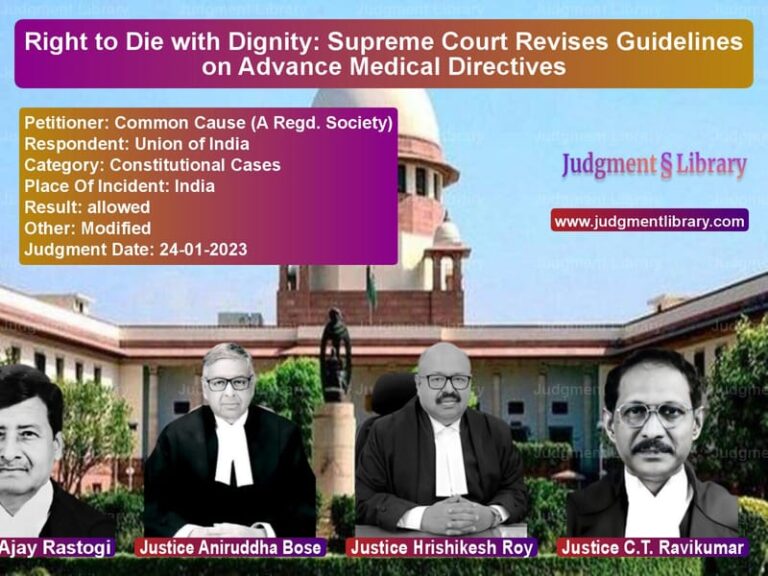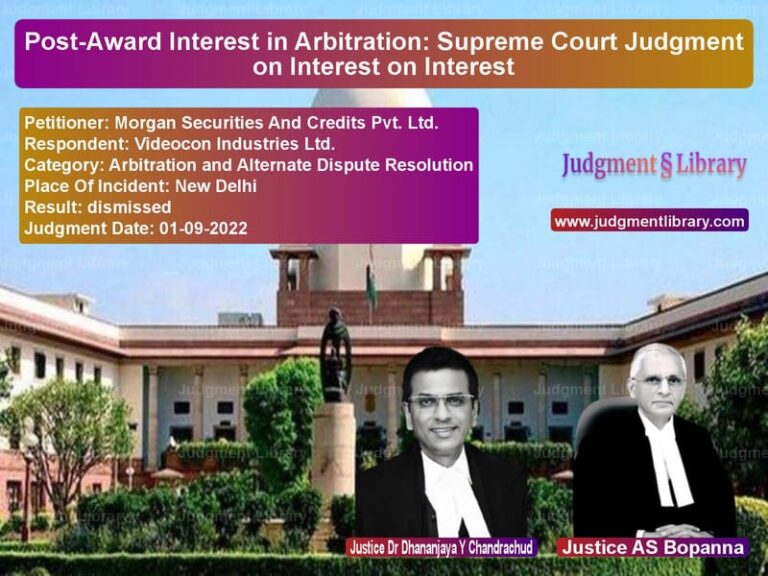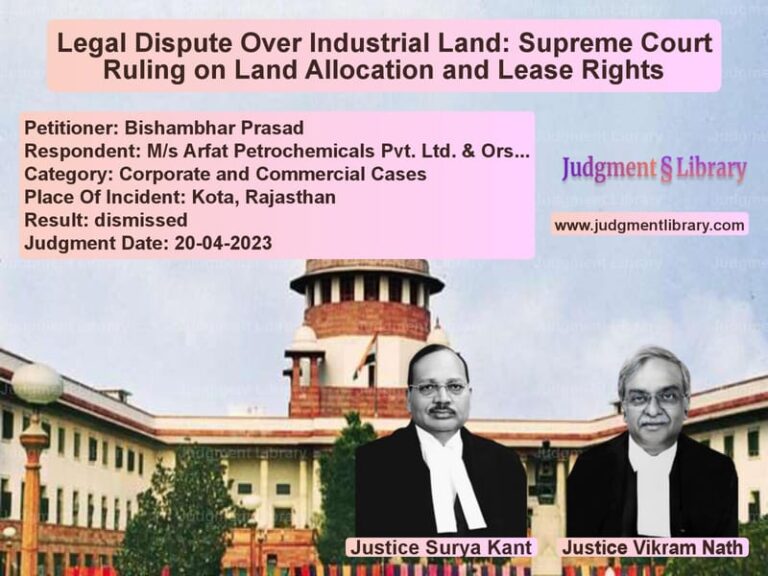Rights of Leprosy Patients: Supreme Court’s Landmark Judgment in Pankaj Sinha vs. Union of India
The Supreme Court of India, in its judgment dated September 14, 2018, in the case of Pankaj Sinha vs. Union of India, addressed critical issues concerning the rights and dignity of individuals affected by leprosy. The Court examined the treatment of leprosy patients, the stigma associated with the disease, and the failure of authorities in eradicating discrimination against those suffering from leprosy.
Background of the Case
Pankaj Sinha, a social activist, filed a writ petition under Article 32 of the Constitution, seeking directions to the Union of India and all States to:
- Conduct periodic national surveys to assess the detection rate of new leprosy cases.
- Ensure free and continuous availability of Multi-Drug Therapy (MDT) for leprosy patients at all Primary Health Centers (PHCs).
- Prevent discrimination against leprosy patients in hospitals, educational institutions, and workplaces.
- Improve hygiene and living conditions in leprosy colonies.
- Provide rehabilitation, welfare measures, and financial support for leprosy-affected individuals.
The petitioner argued that despite advancements in medical science making leprosy fully curable, it continues to be treated as a stigma, leading to ostracization and denial of fundamental rights.
Issues Raised in the Petition
- Non-disclosure of National Sample Survey on Leprosy: The petitioner contended that the government conducted a survey in 2010-2011 but failed to publish its findings.
- Discrimination in Healthcare: Many leprosy patients, particularly women, were denied treatment at hospitals.
- Denial of Education: Children from leprosy-affected families faced discrimination in schools.
- Lack of Basic Facilities: Leprosy colonies lacked sanitation, housing, and access to banking services.
- Non-inclusion in Welfare Schemes: Many leprosy patients were issued APL (Above Poverty Line) cards instead of BPL (Below Poverty Line) cards, preventing them from availing food security benefits.
Government’s Response
The Union of India and various state governments acknowledged the issues raised and stated that steps were being taken to address them. However, the Court found these measures insufficient and directed the authorities to take more concrete actions.
Supreme Court’s Observations
The Supreme Court made the following key observations:
1. Leprosy is Fully Curable
The Court emphasized that leprosy is no longer an incurable disease and that people must be made aware of this fact.
“Leprosy is completely curable with Multi-Drug Therapy (MDT), and with early diagnosis, permanent deformities can be avoided. Yet, due to lack of awareness, those affected by leprosy continue to be stigmatized and face exclusion.”
2. Eradication of Social Stigma
The Court stressed that the stigma surrounding leprosy is rooted in ignorance and needs to be eliminated through sustained awareness campaigns.
3. Right to Healthcare
The Court ruled that all leprosy patients must have access to free and uninterrupted MDT at all public health centers.
4. Right to Education
The Court directed all schools to ensure that children from leprosy-affected families are not discriminated against.
5. Right to Dignity
The Court declared that denying leprosy patients access to healthcare, education, or public services is a violation of Article 21 of the Constitution (Right to Life and Dignity).
Supreme Court’s Directives
The Court issued the following directions:
- Regular National Surveys: The government must conduct periodic national surveys to assess the prevalence of leprosy and ensure that the findings are made public.
- Public Awareness Campaigns: The government must conduct large-scale awareness campaigns to inform people that leprosy is curable and not contagious.
- Free and Uninterrupted Drug Supply: MDT and other leprosy-related medicines must always be available at all public health centers.
- Non-Discrimination in Hospitals: No hospital, whether government or private, should deny treatment to leprosy patients.
- Equal Access to Education: All schools must ensure that children from leprosy-affected families are given free and equal education.
- Issuance of BPL Cards: Leprosy patients must be provided with BPL cards so they can avail benefits under food security and other welfare schemes.
- Rehabilitation and Welfare Measures: The government must formulate a comprehensive rehabilitation program for leprosy-affected individuals.
- Special Housing and Sanitation: The government must ensure that leprosy colonies have adequate housing and sanitation facilities.
- Employment Opportunities: Steps should be taken to provide livelihood opportunities to leprosy patients.
Impact of the Judgment
This landmark ruling is a major step toward ensuring the rights and dignity of leprosy patients in India. The key takeaways from the judgment are:
- Recognition of Leprosy Patients’ Rights: The Court recognized that leprosy patients have the same fundamental rights as all citizens.
- Accountability of Authorities: The ruling makes government agencies accountable for ensuring that leprosy patients are treated with dignity.
- Prevention of Discrimination: The directives aim to eradicate the stigma surrounding leprosy.
- Healthcare Reforms: Ensuring free and continuous availability of MDT will help in eradicating the disease.
The judgment is a milestone in India’s efforts to eliminate leprosy and integrate affected individuals into mainstream society.
Petitioner Name: Pankaj Sinha.Respondent Name: Union of India & Others.Judgment By: Justice Dipak Misra, Justice A.M. Khanwilkar, Justice D.Y. Chandrachud.Place Of Incident: India.Judgment Date: 14-09-2018.
Don’t miss out on the full details! Download the complete judgment in PDF format below and gain valuable insights instantly!
Download Judgment: Pankaj Sinha vs Union of India & Oth Supreme Court of India Judgment Dated 14-09-2018.pdf
Direct Downlaod Judgment: Direct downlaod this Judgment
See all petitions in Fundamental Rights
See all petitions in Public Interest Litigation
See all petitions in Separation of Powers
See all petitions in Judgment by Dipak Misra
See all petitions in Judgment by A M Khanwilkar
See all petitions in Judgment by Dhananjaya Y Chandrachud
See all petitions in allowed
See all petitions in Declared Infructuous
See all petitions in supreme court of India judgments September 2018
See all petitions in 2018 judgments
See all posts in Constitutional Cases Category
See all allowed petitions in Constitutional Cases Category
See all Dismissed petitions in Constitutional Cases Category
See all partially allowed petitions in Constitutional Cases Category

